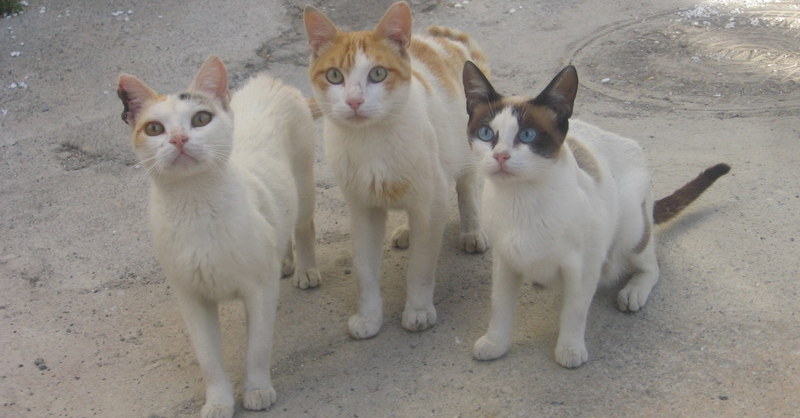Elena Tabuada from Granada, Spain looks after group of around a dozen cats. She feeds them but she isn’t their “owner”.
As the schools go back after the summer break, many people are looking back on enjoyable family summer holidays. My own family headed to southern Spain for a two week migration into sunshine. We were staying in a small mountain village near Granada, and as often happens when I am on holiday, the animals that I encountered made a strong impression on me
The local dogs were not dissimilar to their Irish equivalents. There were pedigree dogs such as Boxers and Miniature Poodles, as well as cross bred terriers and collie-types. They lounged around in the shade during the day, coming out to stroll with their owners in the cooler evenings. I noticed that local pet shops had pedigree puppies for sale, displaying them in cages in their shop front windows in a way that would not happen in Ireland. There was no sign of cats or kittens for sale in this way.
I didn’t come across any pet cats living pampered lives like many Irish cats in the twenty first century. But in one part of the village in particular, there seemed to be cats everywhere. When we walked through the area, they seemed to be all around us. They were on wall-tops and at street corners, or just relaxing in shady spots. When we stopped to watch them for a while, more cats emerged, coming up from underground aqueduct tunnels and from surrounding fields. There were cats of all ages, from young kittens to mature, strong tom cats. They seemed healthy, but thin, and in a typically nosey holidaymaker way, I decided to find out more about their background. I don’t speak much Spanish, but when I asked around about who was looking after the cats, I was referred to Elena. She seemed to be the lady who had most interest in the cats, so I was able to find out more about them.
From what I could gather, the village people didn’t view cats as pets. The cats just existed, doing their own thing, and surviving on their wits and with some help from friendly people like Elena. When I asked who owned the cats, Elena shrugged, and asked me a question: “Who owns the birds?” The cats were friendly, up to a point, but they refused to come closer than a yard or so, and they certainly wouldn’t consider allowing themselves to be petted. Elena liked the cats, and did her best for them, but veterinary care such as vaccinations, worming or treatment of illnesses was not on the agenda. I could see that there were a few young kittens, and at least one of the female cats was heavily pregnant. The male cats were very obviously intact male cats. Neutering and spaying was definitely not happening in this cat community.
The group of cats seemed to be like many feral cat colonies in Ireland. There was enough food to keep a small number of cats healthy and well-fed, but because of the rapid reproduction rate, the population was expanding too rapidly. As a result, the cats were thin and hungry. While we were there, with Elena’s permission, my children enjoyed getting to know the cats better, by feeding them fish scraps from the local fishmonger. But I wondered about how the cats would fare when sentimental tourists like ourselves had gone home.
In Ireland, a trap-neuter-release scheme would be the answer for such a situation. The cats could be trapped one at a time, neutered or spayed, then released back to the same place. This would result in a stable population, with the right number of cats for the available food supply. There would be fewer animals, but they would be well fed. When on holiday, I tried to find out about setting up such a scheme for Elena’s cats.
I visited the local pet vet in a nearby town, but the outcome was disappointing. The vet seemed to be very busy, and after listening to my story through an interpreter, she tut-tutted and shooed me out of her clinic. I realise that I must have come across as a busy-body, interfering tourist trying to impose inappropriate foreign ideas on a normal local situation, but I found it frustrating.
A new charity has been established which aims to offer help animal lovers who find themselves in similar situations to myself when holidaying abroad. Animals Worldwide (AWW) sets up teams of young vets on trap-neuter-release programmes for unowned cats in holiday destinations. AWW has the backing of major UK animal charities such as Battersea Dogs and Cats Home, Dogs Trust and the Donkey Sanctuary.
Holidaymakers are urged to report details to AWW when they come across animals that may need help. AWW has a network of rescue centres and vets working in tourist areas, providing neutering schemes and practical support.
Visit www.animalsworldwide.org to find out more.
Of course, animal welfare issues can be as common in Ireland as they are overseas. When I returned from holiday, I was contacted by a French tourist who wanted to know what he could do about some dogs being kept in conditions that he felt were inadequate in the West of Ireland. It could be argued that we all need to look after our own back yards before getting too fussed about other people’s business!
TIPS
- Many holiday makers come across animals that they feel need veterinary help when they are overseas
- Animals Worldwide (www.animalsworldwide.org) has been set up to help provide assistance for these cases

